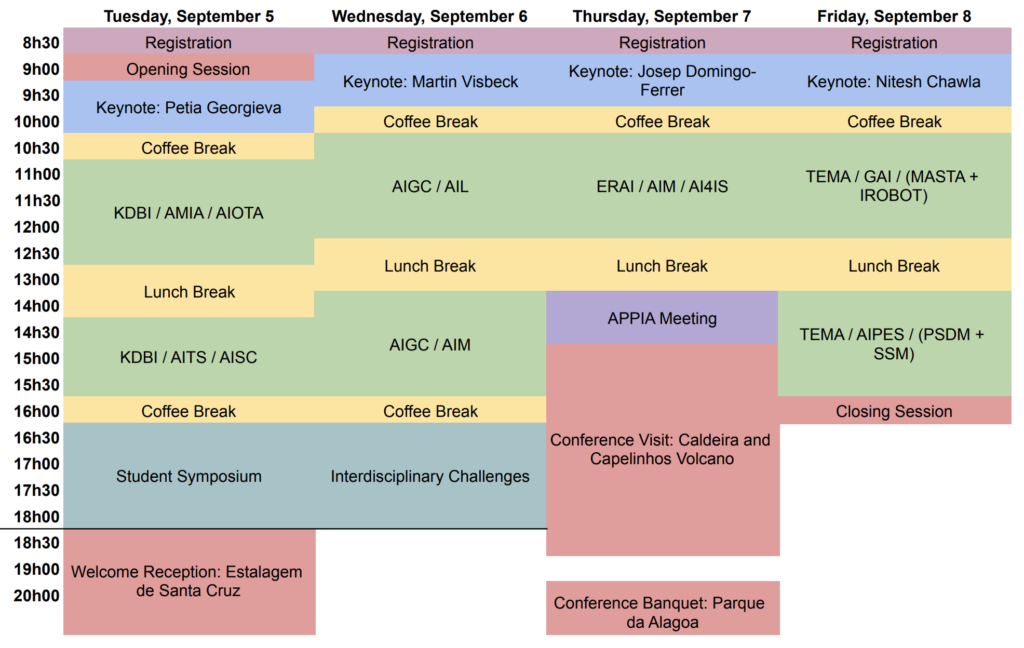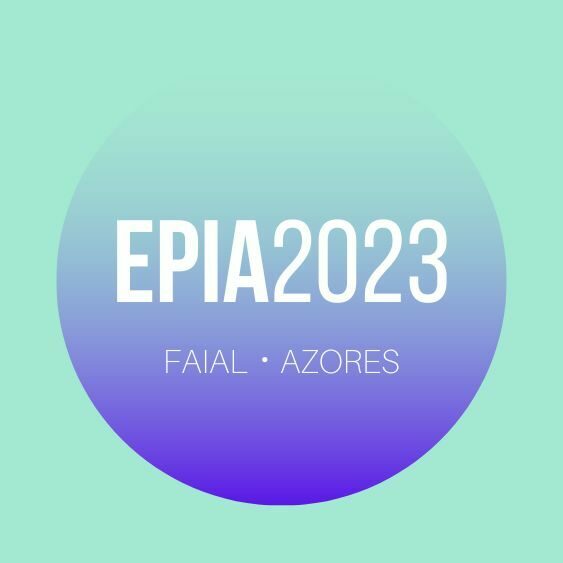PROGRAM

Tuesday, September 5th
09:00-09:30 Opening Session (Ballroom)
09:30-10:30 “Machine Learning Algorithms for Brain-Machine Interfaces” (Ballroom)
- Pétia Georgieva, University of Aveiro, Portugal
Abstract. Brain–machine interfaces (BMIs) create alternative communication channels between the human brain and the external world. Neural activity is recorded, for example through Electroencephalogram (EEG) and the BCI systems aim to transform these electrophysiological signals into control commands or use them to restore lost function, most commonly motor function in paralyzed patients. This talk will give an overview of the past, the present and the future of the BMIs, focusing on machine learning algorithms such as Convolutional Neural Networks and Neural Autoencoders as promising approaches to build noninvasive BMIs.
10:30-11:00 Coffee Break
11:00-13:00 Parallel Sessions
KDBI – I (Ballroom)
- Daniela Soares, Pedro José Pereira, Paulo Cortez and Carlos Gonçalves, “A Comparison of Automated Machine Learning tools for Predicting Energy Building Consumption in Smart Cities”
- Thiago Andrade, Nirbhaya Shaji, Rita P. Ribeiro and João Gama, “Pollution Emission Patterns of Transportation in Porto, Portugal through Network Analysis”
- Rui Jorge Ramos, Lino Oliveira and João Vinagre, “Hybrid SkipAwareRec: A Streaming Music Recommendation System”
- Duarte Melo, Jessica Delmoral and João Vinagre, “Mining Causal Links Between TV Sports Content and Real-World Data”
- Nuno Costa and Nuno Moniz, “Imbalanced Regression Evaluation under Uncertain Domain Preferences”
- André Tse, Lino Oliveira and João Vinagre, “Measuring latency-accuracy trade-offs in Convolutional Neural Networks”
AMIA (Library)
- Sara Guerreiro-Santalla, Dalila Duraes, Helen Crompton, Paulo Novais and Francisco Bellas, “Simulation-Based Adaptive Interface for Personalized Learning of AI Fundamentals in Secondary School”
- Diogo Martinho, Vítor Crista, Ziya Karakaya, Zahra Gamechi, Alberto Freitas, José Neves, Paulo Novais and Goreti Marreiros, “Design and Development of Ontology for AI-based Software Systems to Manage the Food Intake and Energy Consumption of Obesity, Diabetes and Tube Feeding Patients”
- Risa Kimura, Tatsuo Nakajima and Ichiro Satoh, “A Gamified Distributed Infrastructure for Collectively Sharing People’s Eyes”
- David Sec and Peter Mikulecky, “A System for Animal Health Monitoring and Emotions Detection”
AIOTA (Card Room)
- Ana Cláudia Teixeira, Gabriel Carneiro, Raul Morais, Joaquim J. Sousa and António Cunha, “Segmentation as a pre-processing for automatic grape moths detection”
- Ana Rita Baião, Carolina Peixoto, Marta B. Lopes, Pedro Reis Costa, Alexandra M. Carvalho and Susana Vinga, “Evaluating the causal role of environmental data in shellfish biotoxin contamination on the Portuguese coast”
- Gabriel Carneiro, Ana Cláudia Teixeira, Raul Morais, Joaquim João Sousa and António Cunha, “Can the segmentation improve the grape varieties’ identification through images acquired on-field?”
- Daniel Queirós da Silva, Tiago Ferreira Rodrigues, Filipe Neves dos Santos, Armando Jorge Sousa and Vítor Filipe, “Deep Learning-Based Tree Stem Segmentation for Robotic Eucalyptus Selective Thinning Operations”
- Dinis Costa, Catarina Silva, Joana Costa and Bernardete Ribeiro, “Enhancing Pest Detection Models through Improved Annotations”
- André Baltazar, Filipe Santos, Salviano Soares, António Paulo Moreira and José Boaventura Cunha, “Sound-based Anomalies Detection in Agricultural Robotics Application”
13:00-14:30 Lunch Break (Barão Palace)
14:30-16:00 Parallel Sessions
KDBI – II (Ballroom)
- João Miguel Silva, Ana Nogueira, José Pinto, António Alves and Ricardo Sousa, “Time-series pattern verification in CNC machining data”
- Gonçalo Cabaço, Sérgio Oliveira, André Alegre, Nuno C. Marques, João Manso and João Marcelino, “Analysis of Dam Natural Frequencies Using a Convolutional Neural Network”
- Paulo J.S. Ferreira, João Mendes-Moreira and Arlete Rodrigues, “Studying the impact of sampling in highly frequent time series”
- Eduardo M. Rodrigues, Yassine Baghoussi and João Mendes-Moreira, “Interpreting What Is Important: An Explainability Approach And Study On Feature Selection”
AISC (Library)
- Mohamed Abdel Rahman, Ahmed Dahroug and Sherin Moussa, “Using Artificial Intelligence for Trust Management Systems in Fog Computing”
- Eva Pajorova, Peter Krammer and Ladislav Hluchy, “Using Hyperspectral Images and Lidar Data to Create Models for the Classification and CAVE visualization of Tree Species”
- Radwa Nassar, Abdelmoniem Helmy and Nagy Ramdan, “Depression Detection for Twitter Users using Machine Learning Sentiment Analysis”
- Areeg Ahmed, Shahira Azab and Yasser Abdelhamid, “Source-Code Generation using Deep Learning: A Survey”
- Muhammad Ali, Sehrish Munawar Cheema, Ivan Miguel Pires, Ammerha Naz, Zaheer Aslam, Nasir Ayub and Paulo Jorge Coelho, “An IoT-Based Framework for Sustainable Supply Chain Management System”
AITS (Card Room)
- António Ribeiro da Costa, Zafeiris Kokkinogenis and Rosaldo Rossetti, “An Ethical Perspective on Intelligent Transport Systems”
- André Duarte and Arlindo Oliveira, “Improving Address Matching using Siamese Transformer Networks”
- Martin Aleksandrov and Tobias Labarta “Safety, Stability, and Efficiency of Taxi Rides”
- Cláudia Rodrigues, Marco Veloso, Ana Alves and Carlos Bento “Using CDR Data to Understand Post-Pandemic Mobility Patterns”
16:00-16:30 Coffee Break
16:30-18:30 Student Symposium (Ballroom)
- Daniel Agostinho “Emotional state classification from brain signals using CNNs adapted for fMRI signal properties”
- Daniela Pais “Learning Postoperative Pain through Physiological Signals”
- Teresa Pereira “Electrocardiogram for Biometric Recognition: Collectability, Stability and Application Challenges”
- Cesar Andrade “Clustering Massive, Noisy, and Unstructured Textual Streams”
- Marco Rondina “Data Quality, Data Balance and Data Documentation: a framework”
- Michal Lewandowski “Estimating the Density Ratio with a ReLU Induced Tessellation”
- Rui Melo “A Semantic Search System for the Supremo Tribunal de Justiça”
- David Makiya “Addressing Self-Sustainability in Multi-Agent Systems through Combating Terrorism Financing”
- Margarida Costa “Data Leakage Detection and Data Denoising using Causal Mechanisms for Recommender Systems”
- Mubarak Hussain “Can we hold AGI-enabled Robot Morally Responsible for their Actions?”
- Serkan Sulun “Symbolic music generation conditioned on continuous-valued emotions”
- Yi Yang Liu “Exploring GenAI Art Tools By Designing Visual Culture Chatbot Assistant: A Case Study In Higher Education”
18:30-20:00 Welcome Reception (Estalagem de Santa Cruz)
WedNESday, September 6th
08:30-09:00 Registration
09:00-10:00 “Digital Twins of the Ocean” (Ballroom)
- Martin Visbeck, University of Kiel, Germany
Abstract.
10:00-10:30 Coffee Break
10:30-12:30 Parallel Sessions
AIL (Ballroom)
- Pedro Freitas and Luis Mendes Gomes “Does ChatGPT Pass the Brazilian Bar Exam?”
- Hidelberg O. Albuquerque, Ellen Souza, Adriano L.I. Oliveira, David Macêdo, Cleber Zanchettin, Douglas Vitório, Nádia F. F. da Silva and André C.P.L.F. de Carvalho “On the Assessment of Deep Learning Models for Named Entity Recognition of Brazilian Legal Documents”
- Jacopo Ciani Sciolla and Ludovica Paseri “Anonymisation of Judicial Rulings for Legal Analytics Purposes: Ethics, Law, and Compliance”
- Nuno Cordeiro, João Dias and Pedro A. Santos “LeSSE – A Semantic Search Engine applied to Portuguese Consumer Law”
- Rui Melo, Joao Dias and Pedro A. Santos “A Semantic Search System for the Supremo Tribunal de Justiça”
- Nídia Moreira, Pedro Freitas and Paulo Novais “The AI Act meets General Purpose AI: the good, the bad and the uncertain”
AIGC – I (Library)
- Alberto Calleo and Ludovica Rosato “Human + non-human creative identities. Symbiotic synthesis in industrial design creative processes”
- Manex Agirrezabal, Hugo Gonçalo Oliveira and Aitor Ormazabal “Erato: Automatizing Poetry Evaluation”
- Serkan Sulun, Pedro Oliveira and Paula Viana “Emotion4MIDI: a Lyrics-based Emotion-Labeled Symbolic Music Dataset”
- Joscha Bach and Liane Gabora “A Path to Generative Artificial Selves”
12:30-14:00 Lunch Break (Barão Palace)
14:00-16:00 Parallel Sessions
AIM (Ballroom)
- Tetiana Biloborodova, Bríd Brosnan, Inna Skarga-Bandurova and Daniel J. Strauss “Generalization Ability in Medical Image Analysis with Small-Scale Imbalanced Datasets: Insights from Neural Network Learning”
- Bruno Ribeiro, Isabel Curioso, Ricardo Santos, Federico Guede-Fernández, Pedro Coelho, Jorge Santos, José Fragata, Ana Londral and Inês Sousa “Unravelling Heterogeneity: A Hybrid Machine Learning Approach to Predict Post-Discharge Complications in Cardiothoracic Surgery”
- Giovanni Baj, Arjuna Scagnetto, Luca Bortolussi and Giulia Barbati “Deep learning survival model to predict atrial fibrillation from ECGs and EHR data”
- Roberta Coletti and Marta Lopes “Multi-omics data integration and network inference for biomarker discovery in glioma”
AIGC – II (Library)
- Anaïs Giannuzzo “Creativity, intentions, and self-narratives: Can AI really be creative?”
- Jorge Santos, Rafael Murta, João Miguel Cunha, Sérgio Rebelo, Tiago Martins and Pedro Martins “Evolving Urban Landscapes”
- Corina Catarau-Cotutiu, Esther Mondragón and Eduardo Alonso “AIGenC: AI Generalisation via Creativity”
16:00-16:30 Coffee Break
16:30-19:00 Interdisciplinary Challenges (Ballroom)
ThurSday, September 7th
08:30-09:00 Registration
09:00-10:00 “On the use (and misuse) of differential privacy in machine learning” (Ballroom)
- Josep Domingo-Ferrer, Universitat Rovira i Virgli, Spain
Abstract. Machine learning (ML) is vulnerable to security and privacy attacks. Whereas security attacks aim at preventing model convergence or forcing convergence to wrong models, privacy attacks attempt to disclose the data used to train the model. This talk will focus on privacy attacks. After reviewing them, I will examine the use of differential privacy (DP) as a methodology to protect against them, both in centralized and decentralized ML (federated learning). I will show that DP-based ML implementations do not deliver the “ex ante” privacy guarantees of DP. What they deliver is basically noise addition similar to the traditional statistical disclosure control approach. The actual level of privacy offered must be assessed “ex post”, which is seldom done. I will present empirical results that show that standard anti-overfitting techniques in ML can achieve a better utility/privacy/efficiency trade-off than DP.
10:00-10:30 Coffee Break
10:30-12:30 Parallel Sessions
AIM – II (Ballroom)
- Afonso Lobo, Agostinho Barbosa, Hugo Peixoto, Tiago Guimarães, Manuel Santos and João Lopes “Better Medical Efficiency by means of Hospital Bed Management Optimization – a Comparison of Artificial Intelligence Techniques”
- Maria Pedroto, Alipio M. Jorge, João Mendes Moreira and Teresa Coelho “Combining neighbor models to improve predictions for ATTRv”
- Ana Silva, Pedro Chaves, Sara Rijo, João Boné, Tiago Oliveira and Paulo Novais “Leveraging TFR-BERT for ICD Diagnoses Ranking”
- Larissa Montenegro, Luis Mendes Gomes and José Machado “AI-Based Medical Scribe to Support Clinical Consultations: A Proposed System Architecture”
AI4IS (Library)
- Jonathan Dreyer, Stefano Carrino, Hatem Ghorbel and Paul Cotofrei “Tool Wear Monitoring Using Multi-Sensor Time Series and Machine Learning”
- Bruno Veiga, Tiago Pinto, Ruben Teixeira and Carlos Ramos “Vision Transformers applied to Indoor Room Classification”
- Georg Rottenwalter, Marcel Tilly, Christian Bielenberg and Katharina Obermeier “Advancements in synthetic data extraction for industrial injection molding”
- Jorge Lopes, Feliz Gouveia, Vítor Silva, Rui S. Moreira, José Torres, Maria João Guerreiro and Luis Paulo Réis “Using Deep Learning for Building Stock Classification in Seismic Risk Analysis”
- Bo Nørregaard Jørgensen and Zheng Ma “Digital Twins: Benefits, Applications and Development Process”
- Beatriz Rodrigues, Carlos Fernandes and Filipe Portela “Data Mining Models to predict parking lot availability”
ERAI (Card Room)
- Tânia Carvalho, Nuno Moniz and Luís Antunes “A Three-Way Knot: Privacy, Fairness, and Predictive Performance Dynamics”
- Paulo Rupino da Cunha and Jacinto Estima “Navigating the landscape of AI ethics and responsibility”
- Marco Rondina, Antonio Vetrò and Juan Carlos De Martin “Completeness of Datasets Documentation on ML/AI repositories: an Empirical Investigation”
- Rui D. Ferreira, António Grilo and Maria João Maia “A Maturity Model for industries and organizations of all types to better adopt Responsible AI – preliminary results”
- Catarina Silva, Tiago Faria and Bernardete Ribeiro “Towards Interpretability in Fintech Applications via Knowledge Augmentation”
12:30-14:00 Lunch Break (Barão Palace)
14:00-15:00 APPIA Meeting (Ballroom)
15:00-18:00 Conference Visit (Caldeira and Capelinhos Vulcano)
19:30-22:00 Conference Banquet (Parque Alagoa)
Friday, September 8th
08:30-09:00 Registration
09:00-10:00 “Learning on Graphs” (Ballroom)
- Nitesh Chawla, University of Notre Dame, USA
Abstract. Graphs are ubiquitous across a variety of use-cases, and have emerged as a powerful means of representing complex systems. Graph Neural Networks have demonstrated exceptional effectiveness in handling graph data; however, there are numerous challenges from multiple data modalities to lack of labeled data. In this talk, I’ll introduce our work on learning from multiple data, and also the ideas of learning from limited data, including few-shot and self-supervised learning. I’ll also discuss applications of these methods.
10:00-10:30 Coffee Break
10:30-12:30 Parallel Sessions
TEMA – I (Ballroom)
- Luís Filipe Cunha, Ricardo Campos and Alípio Jorge “Event Extraction for Portuguese: A QA-driven Approach using ACE-2005”
- Victor Hugo Rocha, Paulo Pirozelli, Igor Cataneo Silveira, Fabio Cozman and Denis Deratani Mauá “Assessing Good, Bad and Ugly Arguments Generated by ChatGPT: a New Dataset, its Methodology and Associated Tasks”
- Filipe Cerveira Do Amaral, H. Sofia Pinto and Bruno Martins “Argumentation Mining from Textual Documents Combining Deep Learning and Reasoning”
- João António Rodrigues, Luís Gomes, João Silva, António Branco, Rodrigo Santos, Henrique Lopes Cardoso and Tomás Osório “Advancing Neural Encoding of Portuguese with Transformer Albertina PT”
- Afonso Sousa and Henrique Lopes Cardoso “OSPT: European Portuguese Paraphrastic Dataset with Machine Translation”
- Cesar Andrade, Rita Ribeiro and João Gama “Topic Model with Contextual Outlier Handling: a Study on Electronic Invoice Product Descriptions”
GAI (Library)
- Luis Rosário, Sofia Cavaco, Joaquim Silva, Luís Freitas and Philippe Verbogh “Vocalization Features to Recognize Small Dolphin Species for Limited Datasets”
- Gargi Roy, Kane Warrior and Dalia Chakrabarty “Covariance Kernel Learning Schemes for Gaussian Process Based Prediction using Markov Chain Monte Carlo”
- Bernardo Esteves, Francisco S. Melo and Miguel Vasco “Pre-training with Augmentations for Efficient Transfer in Model-based Reinforcement Learning”
MASTA + IROBOT (Card Room)
- Siva Kailas, Wenhao Luo and Katia Sycara “Multi-Robot Adaptive Sampling for Supervised Spatiotemporal Forecasting”
- Hajar Baghcheband, Carlos Soares and Luis Paulo Reis “Machine Learning Data Markets: Evaluating the Impact of Data Exchange on the Agent Learning Performance”
- Maria Lopes, Antonio P. Moreira, Manuel Silva and Filipe Santos “A Review on Quadruped Manipulators”
12:30-14:00 Lunch Break (Barão Palace)
14:00-16:00 Parallel Sessions
TEMA – II (Ballroom)
- Derguene Mbaye and Moussa Diallo “Beqi: Revitalize the Senegalese Wolof Language with a Robust Spelling Corrector”
- Shamsuddeen Hassan Muhammad, Pavel Brazdil and Alípio M. Jorge “Leveraging Symbolic and Deep Learning Techniques for Explainable Sentiment Analysis”
- Vasco Campos, Ricardo Campos and Alipio M. Jorge “Tweet2Story: Extracting Narratives From Twitter”
- Diogo Tavares, Pedro Azevedo, David Semedo, Ricardo Sousa and Joao Magalhaes “Task Conditioned BERT for Joint Intent Detection and Slot-filling”
- Marian Lambert, Thomas Schuster, Marcus Kessel and Colin Atkinson “Robustness Analysis of Machine Learning Models using Domain-Specific Test Data Perturbation”
- Fernando Duarte, Nuno Lau, Artur Pereira and Luis Reis “Revisiting Deep Attention Recurrent Networks”
- Richard Jonker, Roshan Poudel, Olga Fajarda, José Oliveira, Rui Lopes and Sérgio Matos “DyPrune: Dynamic pruning rates for neural networks”
AIPES (Library)
- Aria Jozi, Tiago Pinto, Luis Gomes, Goreti Marreiros and Zita Vale “Rule-based system for intelligent energy management in buildings”
- Bruno Ribeiro, Luis Gomes and Zita Vale “A novel federated learning approach to enable distributed and collaborative genetic programming”
- Balázs András Tolnai, Zheng Ma and Bo Nørregaard Jørgensen “A Scoping Review of Energy Load Disaggregation”
- Bruno Mota, Pedro Faria and Carlos Ramos “Production Scheduling for Total Energy Cost and Machine Longevity Optimization through a Genetic Algorithm”
PSDM + SSM (Card Room)
- Nikolai Antonov, Přemysl Šůcha and Mikoláš Janota “Data-driven Single Machine Scheduling Minimizing Weighted Number of Tardy Jobs”
- Leah Chrestien, Tomas Pevny, Stefan Edelkamp and Antonín Komenda “Heuristic Search Optimisation using Planning and Curriculum Learning Techniques”
- Josef Janda and Kamila Štekerová “Review of Agent-Based Evacuation Models in Python”
16:00-16:30 Closing Session (Ballroom)

